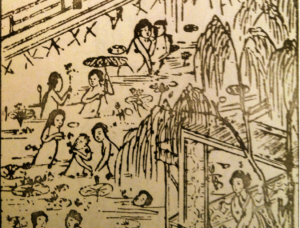Presented By: Medieval and Early Modern Studies (MEMS)
The Premodern Colloquium. Science Fictions: Early Modern Technological Change and Literary Response
S. E. Kile, Michigan Society of Fellows, Asian Languages & Cultures

This paper is a comparative study of literary responses to revolutionary technological change in the early modern period. In Europe at the turn of the seventeenth century, advancements in optical lens technology transformed human experiences of vision and notions of expertise alike, from the quotidian (improved vision through eyeglasses) to the philosophical (optical instruments as metaphors for human vision) to the astronomical (Galileo’s observations with the telescope). At least by 1630, Jesuit emissaries had brought telescopes and other optical instruments to the Ming imperial court, and lenses became part and parcel of everyday life in the Yangzi River Valley, becoming by the early Qing objects of local manufacture.
I assess a category of responsive texts that might be termed “lens fictions,” which make imaginative use of new ocular technologies in literary experiments with subject matter, narrative, and genre. Much fiction about science, however, fits poorly into the genre we have come to call science fiction: whereas an English “lens fiction” like Margaret Cavendish’s The Blazing World, with its account of other worlds populated with extraterrestrial beings, might be assimilated to this category, a Chinese “lens fiction” such as Li Yu’s “Xiayi lou” (“A Tower for Summer Heat”) would fail the test, precisely because it lacks an interest in future or parallel worlds predominantly associated with science fiction. I discuss “science fictions,” or the narrative and generic experiments and innovations inspired by lenses, to think comparatively about how we might develop the analytical problem of genre across literary sites that coincided in global historical time but lacked any currents of literary exchange or translation.
I assess a category of responsive texts that might be termed “lens fictions,” which make imaginative use of new ocular technologies in literary experiments with subject matter, narrative, and genre. Much fiction about science, however, fits poorly into the genre we have come to call science fiction: whereas an English “lens fiction” like Margaret Cavendish’s The Blazing World, with its account of other worlds populated with extraterrestrial beings, might be assimilated to this category, a Chinese “lens fiction” such as Li Yu’s “Xiayi lou” (“A Tower for Summer Heat”) would fail the test, precisely because it lacks an interest in future or parallel worlds predominantly associated with science fiction. I discuss “science fictions,” or the narrative and generic experiments and innovations inspired by lenses, to think comparatively about how we might develop the analytical problem of genre across literary sites that coincided in global historical time but lacked any currents of literary exchange or translation.
Explore Similar Events
-
Loading Similar Events...
